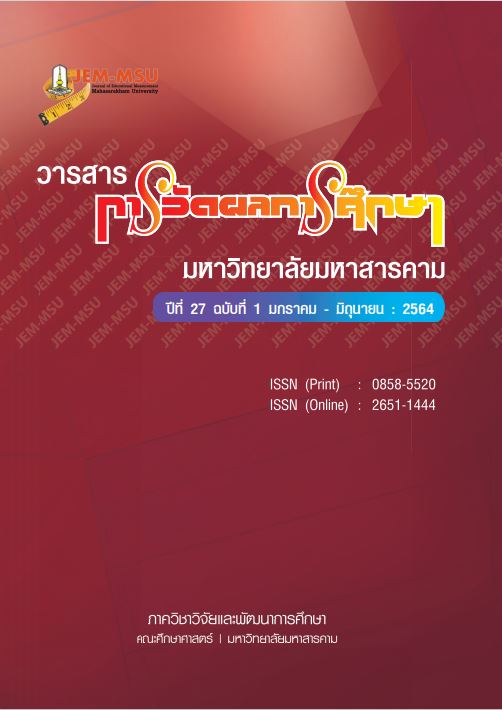Development of STEM teacher’s competencies measurement instrument using TPACK-STEM framework
Main Article Content
Abstract
Information about teacher’s knowledge and competency of STEM instruction is important to STEM teachers’ development and preparation for the teacher’s efficient STEM teaching. Accurate and comprehensive information acquisition of STEM teacher’s significant competencies needs an effective tool. The tool must be able to measure knowledge and ability in learning and teaching design as well as evaluation of learners’ learning, and it must be able to measure the teacher’s STEM knowledge and ability also. This research, therefore, applied the TPACK-STEM conceptual framework in development of an instrument to efficiently measure STEM teacher’s competencies in organizing for learning and teaching. The instrument developed was a questionnaire based on the TPACK-STEM conceptual framework which was multidimensional within item. The instrument was then used to collect data from 310 fifth-year preservice teachers. The data obtained was analyzed to find the quality of the instrument developed.
The findings showed that the STEM teacher’s competency measurement instrument had standard quality, having the reliability of (Cronbach’s alpha, .938 - .953; Omega, .939 - .954), the content validity of (IOC, 0.67-1), and the construct validity of (2 (93, N=310) = 97.950, p = .343, CFI = .999, TLI = .998, SRMR=.019, RMSEA = .013). Consequently, the STEM teacher’s competency measurement instrument can be used to measure STEM teacher’s competencies accurately and efficiently.
Article Details
The content and information contained in the published article in the Journal of Educational Measurement Mahasarakham University represent the opinions and responsibilities of the authors directly. The editorial board of the journal is not necessarily in agreement with or responsible for any of the content.
The articles, data, content, images, etc. that have been published in the Journal of Educational Measurement Mahasarakham University are copyrighted by the journal. If any individual or organization wishes to reproduce or perform any actions involving the entirety or any part of the content, they must obtain written permission from the Journal of Educational Measurement Mahasarakham University.
References
ชนิตา รักษ์พลเมือง. (2560). การศึกษาสภาพและปัญหาการผลิต การใช้ และการพัฒนาครูการศึกษาขั้นพื้นฐานที่สอดคล้องกับความต้องการในอนาคต. วารสารครุศาสตร์, 45(3), 17-33.
รัฏฏิกา ตั้งพุทธิพงศ์. (2559). การวิเคราะห์กระบวนการขับเคลื่อนนโยบายสะเต็มศึกษาจากระดับชาติสู่ห้องเรียน. วิทยานิพนธ์ครุศาสตรมหาบัณฑิต จุฬาลงกรณ์มหาวิทยาลัย.
Abad, F. J., Sorrel, M. A., Garcia, L. F., & Aluja, A. (2018). Modeling general, specific, and method variance in personality measures: Results for ZKA-PQ and NEO-PIR. Assessment, 25(8), 959-977.
Adams, A. E., Miller, B. G., Saul, M., & Pegg, J. (2014). Supporting elementary pre-service teachers to teach STEM through place-based teaching and learning experiences. Electronic Journal of Science Education, 18(5).
Archambault, L.M., & Barnett, J.H. (2010). Revisiting technological pedagogical content knowledge: Exploring the TPACK framework. Computers & Education, 55, 1656-1662.
Brantley-Dias, L., & Ertmer, P. A. (2013). Goldilocks and TPACK: Is the construct “just right?”. Journal of Research on Technology in Education, 46(2), 103–128.
Breiner, J. M., Harkness, S. S., Johnson, C. C., & Koehler, C. M. (2012). What is STEM A discussion about conceptions of STEM in education and partnerships. School Science and Mathematics, 112(1), 3-11.
Chai, C. S. (2019). Teacher professional development for science, technology, engineering and mathematics (STEM) education: A review from the perspectives of technological pedagogical content (TPACK). The Asia-Pacific Education Researcher, 28(1), 5-13.
Drummond, A., & Sweeney, T. (2017). Can an objective measure of technological pedagogical content knowledge (TPACK) supplement existing TPACK measures. British Journal of Educational Technology, 48(4), 928-939.
Eckman, E. W., Williams, M. A., & Silver-Thorn, M. B. (2016). An integrated model for STEM teacher preparation: the value of a teaching cooperative educational experience. Journal of STEM Teacher Education, 51(1), 71-82.
McPherson, S., & Anid, N. M. (2014, March). Preparing STEM teachers for K-12 classrooms: Graduate certificate evaluation and innovation. In 2014 IEEE Integrated STEM Education Conference (pp. 1-6). IEEE.
Mishra, P., & Koehler, M.J. (2006). Technological pedagogical content knowledge: A framework for teacher knowledge. Teachers College Record, 108(6), 1017–1054.
Preacher, K. J., & Coffman, D. L. (2006). Computing power and minimum sample size for rmsea [Computer software]. Retrieved from http://quantpsy. org.
Radloff, J., & Guzey, S. (2016). Investigating preservice STEM teacher conceptions of STEM education. Journal of Science Education and Technology, 25(5), 759-774.
Rahman, S. M., Chacko, S. M., & Kapila, V. (2017, June). Building trust in robots in robotics-focused STEM education under TPACK framework in middle schools. In Proc. ASEE Annual Conference.
Rahman, S. M., Krishnan, J. V., & Kapila, V. (2017, June). Exploring the dynamic nature of TPACK framework in teaching STEM using robotics in middle school classrooms. In Proc. ASEE Annual Conference and Exposition.
Rinke, C. R., Gladstone‐Brown, W., Kinlaw, C. R., & Cappiello, J. (2016). Characterizing STEM teacher education: Affordances and constraints of explicit STEM preparation for elementary teachers. School Science and Mathematics, 116(6), 300-309.
Shernoff, D. J., Sinha, S., Bressler, D. M., & Ginsburg, L. (2017). Assessing teacher education and professional development needs for the implementation of integrated approaches to STEM education. International Journal of STEM Education, 4(13), 1-16.
Štuikys, V., & Burbaité, R. (2018). Smart STEM-Driven Computer Science Education: Theory, Methodology and Robot-based Practices. Springer.
Valtonen, T., Sointu, E., Kukkonen, J., Kontkanen, S., Lambert, M. C., & Mäkitalo-Siegl, K. (2017). TPACK updated to measure pre-service teachers' twenty-first century skills. Australasian Journal of Educational Technology, 33(3).


